
About SharinginHealth
Our Vision is to see enough health care providers to provide quality primary care for all people worldwide
Our Mission is to help train a primary care workforce to meet the health needs of rural, low-resource settings through partnership with existing institutions and organizations.
- what we do
- about us
- why do all this work?
What We Do
Our main activities include:
- gathering, developing, and providing high quality open-access training resources
- offering guidance on the effective use of both medical education strategies and technology
- providing implementation support of our resources, including faculty development and IT
We partner with institutions, such as universities, colleges, and not-for-profit organizations who help train professionals for primary care, including doctors, clinical officers, assistant medical officers, physician assistants, nurses, and midwives.
We are particularly interested in programs that deliver training in rural areas, with the hopes that the students will work in this setting upon graduation.
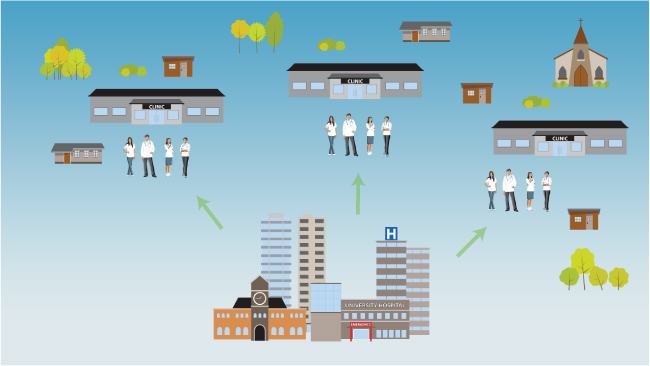
Our Model of Technology
Within this challenging but important context of rural, low-resource primary care clinics and hospitals, we seek to equip clinical teachers and their students with the educational resources they need.
We promote the use of tablets as the main tool for accessing our resources by students, though smart phones and computers may certainly also be used where available.
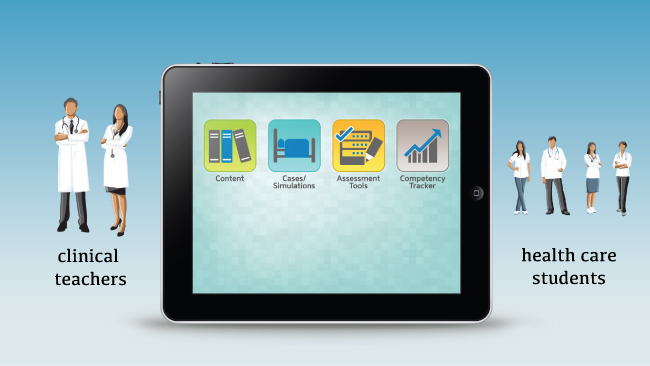
Within a classroom setting, SiH resources are available to the clinical teacher via a laptop's hard drive. A portable projector and set of speakers may be powered by the laptop, which in turn may be powered by an external battery. This allows for function when electricitiy is unavailable.
The laptop can also power a small router, providing a local network for students to access using tablets. This allows function when internet is unavailable, and eliminates wireless data costs during instruction.
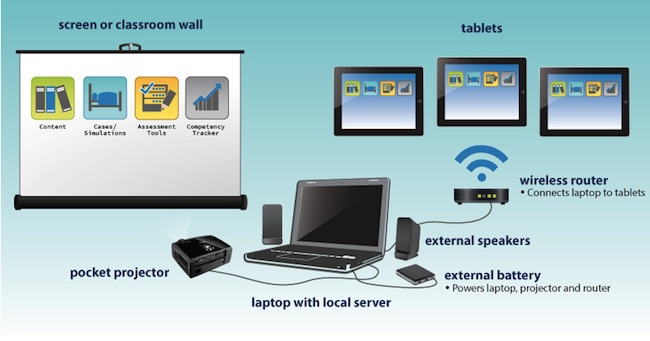
image created by Becca Groombridge
Model of Education
We use approaches that are supported by educational evidence and take into account the challenging conditions of low-resource settings. These include:
Competency based education - clear curricular frameworks, based on the clinical competence needed for a profession
A 'flipped' classroom - content (text, images, videos, and podcasts) provided in advance of learning sessions
Case-based learning - both for self-study and small group learning, including simulations and role play as appropriate
Testing to learn - using quizzes and simulations to solidify learning and identify gaps
Deliberate, spaced practice - regular review of materials learned, to consolidate learning over time
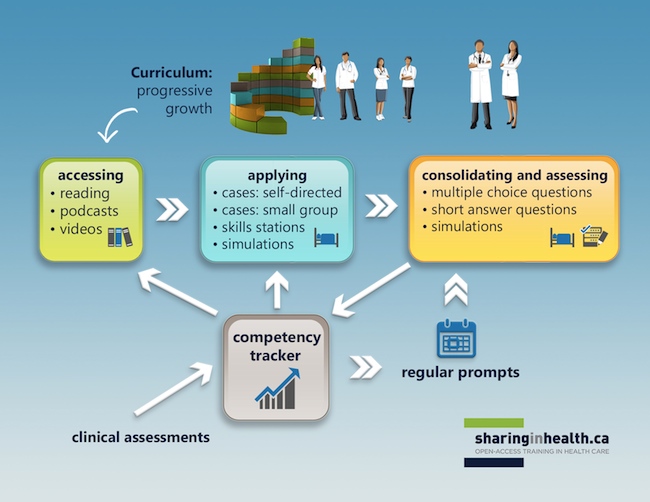
image created by Phil Beard
The foundations of our resources are written so as to be universally relevant, but are also designed to be adapted to specific programs within a particular geography and culture.
Growing Our Resources
When developing topics, we first look for available materials online, drawing from an ever-increasing collection of open-access resources.
Where gaps remain, we engage students and residents as authors of original content, and senior residents, health care professionals, or professors as reviewers. We recruit volunteer contributors widely, and have had many people support us over the years.
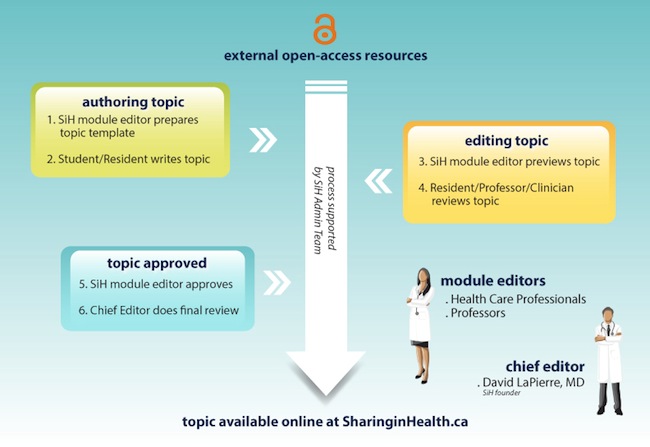
image created by Becca Groombridge
About Us
SharingInHealth (SiH) began through the efforts of one medical student and has grown to include student and professional contributors all around the world. Please visit our contributors page to learn more about the many men and women who have joined our team.
Our values
Holistic healthcare: SiH's Board of Directors personally endeavour to follow Jesus Christ, who demonstrates compassion and care for all, and we aspire to train healthcare students to care for the body, mind and spirit. We welcome the involvement and perspectives of all students, regardless of race, religion, worldviews, or gender orientation, as we see no place for exclusivity, judgment, or condemnation in healthcare.
Forging Partnerships: We endeavour to network with individuals, institutions, and organizations who share our vision and mission. Also, rather than establishing our own training programs, we seek to partner with existing schools and expand their training capacity.
Non-commercial: SiH subscribes to open-source, open-access ethics, and its resources can be used by anyone for non-commercial purposes. We are also completely not-for-profit, with no advertising.
Simplicity and Flexiblity: "Nothing endures but change," and SiH content and technology is designed to be inherently flexible to meet the changing competency needs of today and tomorrow, in various locations and situations.
Our Team
Rebecca Green-LaPierre (Module Editor, Clinical Nutrition)
Being married to SiH’s founder means I have been involved with this fabulous initiative since I met Dave in 2007. As SiH expanded we saw the need to create module editor positions to oversee content development and, as a Registered Dietitian, I formally took on the role of Nutrition Module Editor in 2014. I completed my undergraduate training at University of Guelph in 2003 and received my master’s degree from Mount Saint Vincent University in Halifax in 2008. I am a self-employed clinical/community dietitian in Southwest Ontario and am quite passionate about growing, cooking, eating, and teaching about good food.
Additional to SiH, I give a lot of volunteer time to a local pregnancy resource centre where I help facilitate prenatal and parenting classes. Dave and I have two small kids with the blondest hair and the biggest hearts, and although most days I have no spare time, I do my best to get on my bicycle or on the volleyball court as much as our schedule allows.
Zain Ismail (Board of Directors)
Zain is relationship builder, connector, and a healthcare innovator, with a passion for customer service. Zain is bilingual (English/ French) and a dual citizen (Canadian/ American). Zain serves as Manager of Innovation, Partnerships, Communication, and Development at Leamington District Memorial Hospital (LDMH), connecting and aligning people, ideas, and strategies between the hospital, foundation, and Hospice Erie Shores Campus. In addition, Zain serves as a strategist for the International Centre for Health Innovation at the Ivey Business School, and is a Youth Entrepreneurship Coach for Rise Asset Development. Lastly, Zain is the founder and business development lead for The Moment App, an app that when completed will allow students to communicate their mental health history at the point of care.
Zain holds a bachelor's degree in entrepreneurship & strategy from the Odette School of Business at the University of Windsor, and has completed an executive program in health system innovation at the Ivey Business School at Western University. Zain is also a huge fan of massive open online course (MOOC) and has completed a number of entrepreneurships, innovation, and healthcare related courses through Coursera.org.
Vivian Kilanko ( Board of Directors)
Vivian joined SiH in 2015. A long-term therapist in children’s mental health, Vivian was born in Nigeria, West Africa. She and her family moved to Chatham-Kent in 2007 and enjoy the peaceful life.
Vivian is passionate about issues related to social justice and accessible education. She enjoys exploring the world through the pages of a book, writing her stories and truly lives for the summer months.
Her favourite verse is found in Psalm 3:3: “But you, LORD, are a shield around me, my glory, and the one who lifts up my head”.
Tiffany Kyer (Module Editor, Maternal and Newborn Health)
Tiffany Kyer is a Registered Midwife in Chatham, Ontario and originally from the Niagara Region. She did her midwifery training at a charity birthing centre in the Philippines before attending Ryerson's International Midwifery Pre-Registration Program in 2010 to obtain her Ontario accreditation. While passionate about educating women on their developing babies and changing bodies, she also enjoys the simple pleasure of growing her own food and spending time with her wonderful husband, dog and three cats.
David LaPierre MSc, MD, CCFP (Board of Directors)
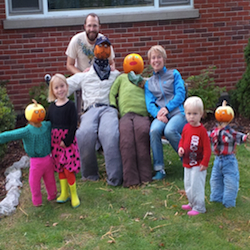
David founded SiH in 2006 as a first year medical student. He is now a family doctor in Ontario, working at the Chatham-Kent Community Health Centre, and remains deeply motivated to see strengthened primary health care worldwide.
When not working in the clinic, in the hospital, or on SiH, David spends most of his time with his wife and two young kids, adventuring outdoors, playing Lego, and creating other fun things to do.
Tina Lively (Module Editor, Pharmacology)
Tina joined Sharing in Health March 2015. She is a pharmacist at the Thamesview Family Health Team in Chatham, Ontario, with a particular interest in wound healing, clinical nutrition and diabetes. She is partner to James and mum to 2 adult children aged 22 & 18 and a lippy hound dog named Gunner.
When not working she enjoys reading and experimenting in the kitchen.
Robyn McLellan (Administration Support)
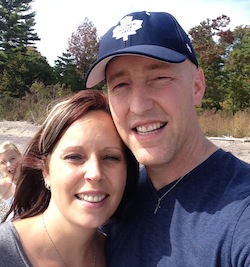
With a passion for organizing and processes, Robyn joined SiH in 2014. She is excited to be able to use her knowledge to assist SiH advance to the next level in its journey.
Robyn also works at the Chatham-Kent Health Alliance. She is a busy mom of 4 children, a Goldendoodle named Sochi and married to a superfantastic man, Darren.
When Robyn is not working, she enjoys camping with her family, reading, journaling and embracing quiet.
Laura MacPherson (Board of Directors)
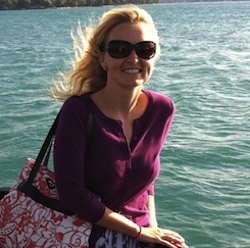
Laura joined SiH in 2014 and is currently the Vice-President. She has also participated in the Preventing Crashes course.
Laura works as a Physician Assistant at Chatham-Kent Health Alliance in the Emergency Department and as part of the Geriatric Mental Health team. She recently completed an Executive Development Program in Health System Innovation through the Ivey School of Business’ International Centre for Health Innovation at Western University. During her undergraduate and graduate studies she went on global health exchanges to Thailand to study Hepatitis A and to Honduras to study Vitamin A deficiency.
In her spare time Laura enjoys running, reading, travelling and spending time with her family & friends.
Raksha Sule (McMaster student volunteer)
Raksha became involved with Sharing in Health in 2012 after a medical brigade to Honduras left her concerned about the sustainability of the community without a local empowerment and partnership initiative. Since then, she has been exploring her passion for integrating global health, medicine and education. She is also excited to start the Masters of Science in Global Health program at McMaster University in September 2015.
Her interests include travelling and becoming immersed in new cultures. She also cannot go a day without playing piano and reading.
Linda Swain (Secretary/Treasurer, Board of Directors)
Linda is a wife, a mom and a business woman who uses her invaluable skills at work to ensure the local children’s agency is running well, in the community as she coaches women to meet their life goals through the NeighbourLink WrapAround program, and internationally as she serves on the SharingInHealth Board.
Alie Teetzel (Initiatives Lead)
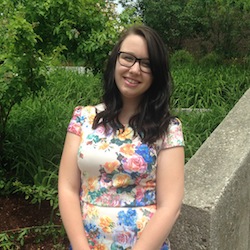
Alie began working at Sharing in Health in 2015, assisting with the Preventing Crashes program, building a social media strategy, and volunteer recruitment.
Alie is a graduate of the University of Waterloo Honours Health Studies (BSc) program with a minor in Gerontology. Alie is very interested in older adult health as well and maternal and newborn health. In her spare time Alie enjoys reading, knitting, and methodically breaking down the themes of Netflix shows.
Julianne Zandberg (Western student volunteer)
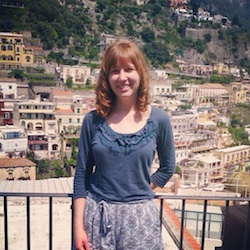
Julianne has been working with Sharing in Health since 2014, assisting with the Preventing Crashes and Maternal Newborn Health modules.
She is recently completed a Bachelor of Health Sciences (BHSc) with Global Health Specialization at McMaster University, and is heading off to medical school at Western in the fall of 2015. Originating in Chatham, Ontario, she is passionate about rural health initiatives, both locally and globally.
She has spent time in Bolivia and the Dominican Republic, working with small communities and doing global health research. She enjoys writing about almost anything, long distance running, and snowstorms.
Why do all this Work?
The world faces a severe shortage of health care providers, estimated at 3.5 million workers worldwide. This shortage has a major impact on progress towards health indicators, and is the motivation for our work.
- learn more: Global Shortage of Health Workers, Brain Drain Stress Developing Countries. JAMA 2007
- learn more: Providing the Providers — Remedying Africa's Shortage of Health Care Workers. NEJM 2007
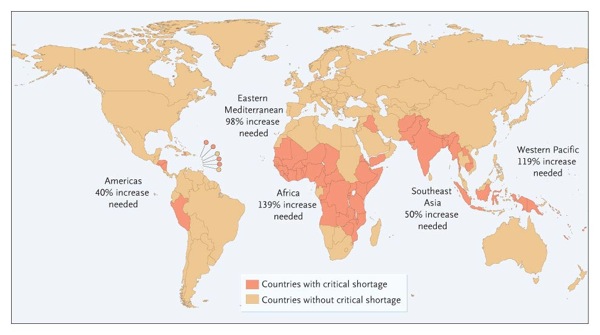
from NEJM, 2007
Many people ask if we are duplicating what already exists. While there are tremedous resources available (that we always seek to partner with), there are some key differences to the Sharing In Health approach that convince us to press on:
Open-access: freely available, and designed to be adapted
We want institutions using our work to modify cases and assessment tools according to their specific curricular, cultural, and geographical needs. Our open-access license permits just this.
Level of curricular material: for students
Resources are typically aimed at residents and staff, (eg UpToDate and eMedicine), or at the general public (eg Medlineplus or medpedia). SiH resources are meant for health professions students and their teachers.
Clinical setting: primary care in rural, low resource areas
Many resources are developed for well-resourced settings (for example, North America and Europe) and may not be applicable to low-resource settings. Differences include disease patterns, availability of consultant specialists, and diagnostic and treatment capabilities.
Breadth of our content: everything students need to learn, but not more
It is certainly important to learn 'the etiology of pneumonia' or 'the differential diagnosis of chest pain'. These are well-described online, the above points non-withstanding. However, it is more difficult to find information on topics such as communication skills, clinical reasoning, health care advocacy, or patient centred health care. We seek to meet all these needs.

courtesy of Will Lion
Conversely, there is actually much more information online than primary care students need to learn. This can be confusing and overwhelming when students are trying to study effectively.
We aim to reduce extra 'noise' to help students focus on material they really need to learn.
How it's accessed: online or offline
Affordable, reliable, fast internet access is a serious hindrance for many learners, and will remain this way in many settings for at least the next few years.
How it's organized: easy to use
Some resources are clunky to navigate, making it difficult and slow to find what you're looking for. While there is always room to improve, we hope our site makes it easy to connect with the information students need, when they need it.
How it's taught and learned: engagement through cases and assessment
We use the best available approaches to medical education described in the literature. One of the critical shortages worldwide is of clinical teachers, and our resources are designed to be easily used by busy clinicians as they facilitate student learning. As described, content, cases, and assessment tools are all linked in easy-to-use ways.
Do you have more questions about any of this? Please send comments or questions to admin@sharinginhealth.ca
Thanks for your interest!

